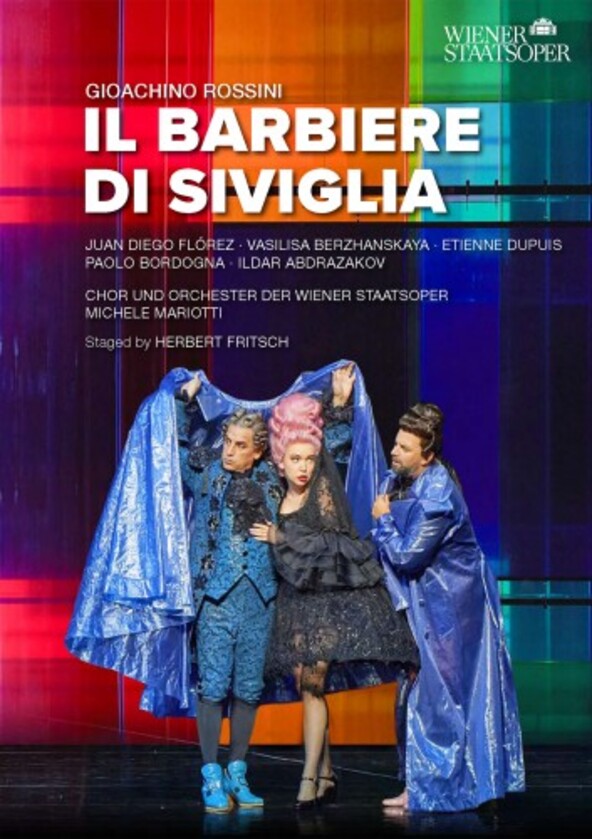ROSSINI Il barbiere di Siviglia (Mariotti)
View record and artist detailsRecord and Artist Details
Genre:
Opera
Label: C Major
Magazine Review Date: 02/2024
Media Format: CD or Download
Media Runtime: 170
Mastering:
DDD
Catalogue Number: 765308

Tracks:
| Composition | Artist Credit |
|---|---|
| (Il) Barbiere di Siviglia, '(The) Barber of Seville' |
Gioachino Rossini, Composer
Aurora Marthens, Berta, Soprano Étienne Dupuis, Figaro, Baritone Ildar Abdrazakov, Don Basilio, Bass Juan Diego Flórez, Almaviva, Tenor Michele Mariotti, Conductor Paolo Bordogna, Doctor Bartolo, Baritone Stefan Astakhov, Fiorello, Baritone Vasilisa Berzhanskaya, Rosina, Mezzo soprano Vienna State Opera Chorus Vienna State Opera Orchestra |
Author: Richard Osborne
It took a French theatre director of genius, Jean-Pierre Ponnelle, to give us a near-definitive staging of the Beaumarchais-Rossini Il barbiere di Siviglia. Filmed in 1972 in a performance conducted by Claudio Abbado, it was complemented 45 years later by a very different but no less revelatory staging in which another Paris-born director, Laurent Pelly, collaborated with conductor Jérémie Rhorer to provide a revealingly modernist take on the opera.
Stripping out the 18th-century setting in order to lay bare Rossini’s essentially neoclassical take on the Beaumarchais original can work if the director recognises that the comedy resides in the music. If the staging moves with the music, all will be well; if not, you may end up with the kind of meaningless farrago we have in this Vienna State Opera staging by Herbert Fritsch.
It’s a production without a location, without props and with nothing resembling meaningful characterisation. Dressed in psychedelically coloured mock-rococo costumes, the singers simply mug and mime their way through the action against the background of an endlessly changing coloured cyclorama. ‘Like Mondrian gone wild’ wrote veteran Viennese critic Gerhard Persché, whose wider assessment – ‘more a study in stage gymnastics, resembling a line of puppets on strings rather than a cast of real characters’ – just about says it all. In the theatre, Fritsch’s staging may have worked as a species of operatic son et lumière; filmed in close-up for TV, it resembles nothing more than a kind of bizarre dream.
Unsurprisingly, given that the characters have been drained of significance, the singers end up sounding bland, even Juan Diego Flórez. How dispiriting it is to hear him making little attempt to sing Almaviva’s Act 1 canzone ‘Se il mio nome’ – a love song that is both a bel canto classic and a realistic portrait of a man sick with nerves – as it should be sung. Since the original 1816 text is played complete, Flórez does eventually have his moment in the sun with Almaviva’s frequently omitted grand concluding aria, ‘Cessa di più resistere’. Here for the first time in over two and a half hours, the company stands and listens rather than cavorting round the stage playing the giddy goat. A case, you might say, of Orpheus taming the beasts.
Discover the world's largest classical music catalogue with Presto Music.

Gramophone Digital Club
- Digital Edition
- Digital Archive
- Reviews Database
- Full website access
From £8.75 / month
Subscribe
Gramophone Full Club
- Print Edition
- Digital Edition
- Digital Archive
- Reviews Database
- Full website access
From £11.00 / month
Subscribe
If you are a library, university or other organisation that would be interested in an institutional subscription to Gramophone please click here for further information.




